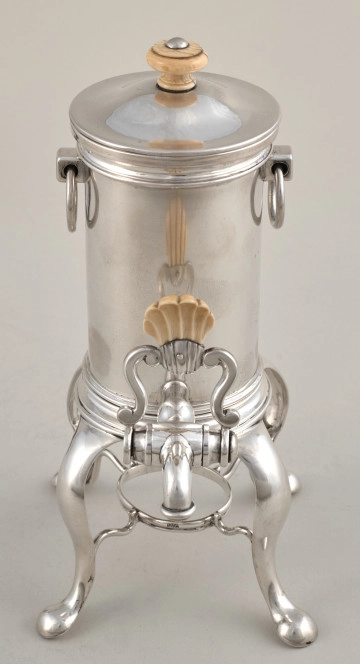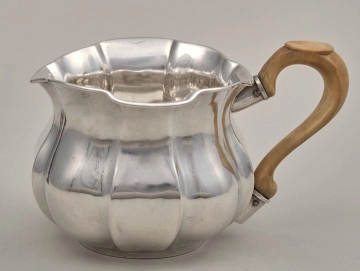
Tea can
20th century
Castle Museum in Łańcut
Part of the collection: Goldsmiths
Basket A basket/ decanter tray from the Potocki collection, plated; a French product from the end of the 19th century. A round basket with a flat bottom and openwork sides. The openwork part comprises overlapping arcades, folded at the top and making up a type of ambulatory. Two makers’ marks on one of the arcades. The decanter trays appeared around 1760. The sides of trays were made of silver sheet decorated with openwork floral or geometric ornaments. It must be noted here that trays of this type were used to put decanters and not bottles on them. The most decorative trays were made of gilded silver with bases decorated with engraved coats of arms. In the late 19th century, trays with high openwork sides became fashionable. Plating is a technique consisting in coating a copper sheet with a layer of silver film. It was invented in 1743 by Thomas Boulsover in Sheffield. Soon afterwards, a large production plant of plated products was set up there, initially manufacturing minor items, such as boxes and buttons, but already around 1750 production of entire tableware sets was started, where the layer of silver was only on the external part and the inside was covered with tin. After the introduction of double-sided silvering approx. 1770, the Sheffield products enjoyed their “golden age” until approx. 1800. In 1824, the first Polish plated products appeared, which is related to the start of production by Józef Fraget. The plating technique disappeared after the introduction of galvanic silver plating, which was easier and much cheaper thanks to the smaller amount of silver used in the process.
Dimensions
height: 3 cm
Object type
Goldsmithing
Material
metal
Creation time / dating
Owner
Castle Museum in Łańcut
Identification number
Location / status

unknown
20th century
Castle Museum in Łańcut

unknown
19th (?) century
Castle Museum in Łańcut

unknown
19th (?) century
Castle Museum in Łańcut
DISCOVER this TOPIC
Museum of King Jan III's Palace at Wilanów
DISCOVER this PATH
Educational path
0/500

We use cookies to make it easier for you to use our website and for statistical purposes. You can manage cookies by changing the settings of your web browser. More information in the Privacy Policy.
We use cookies to make it easier for you to use our website and for statistical purposes. You can manage cookies by changing the settings of your web browser. More information in the Privacy Policy.
Manage cookies:
This type of cookies is necessary for the website to function. You can change your browser settings to block them, but then the website will not work properly.
WYMAGANE
They are used to measure user engagement and generate statistics about the website to better understand how it is used. If you block this type of cookies, we will not be able to collect information about the use of the website and we will not be able to monitor its performance.